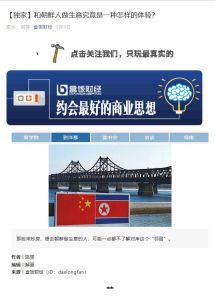
Recommendation
For Chinese people living by the border, North Korea is more than a headline or a caricature of a totalitarian regime headed by a dictator. For them, North Korea is an everyday reality, a neighbor that simultaneously presents opportunities and causes throbbing migraines. China provides North Korea with most of its food and energy supplies and accounts for more than 90% of North Korea’s total trade volume. As North Korea seems to reach out to the world and focus on economic development, reporter Yao Yun of Da Xiong Fan, a wemedia account covering business, investigates into how the Chinese who interact most often with North Koreans at the border look at these recent events. Yao shines a light on life at the border and recommends taking what North Korea says with a grain of salt. The article comes across as biased toward the Chinese and will make some readers curious to hear the North Korean perspective. In the meantime, getAbstract recommends reading this article while you wait.
Summary
About the Author
Yao Yun is a lead reporter and writer for Da Xiong Fan, a wemedia account offering business insights and financial news.








Comment on this summary